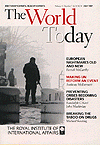|
|
|
|
|
|

The World Today
July, 1997
Kofi Annan became Secretary-General of the UN because its paymasters --especially the United States--wanted reform. Six months on he is about to announce a package of changes. There is also discussion about membership of the Security Council. Can reform become a real event rather than another protracted process?
Anthony McDermott is a senior researcher at the International Peace Research Institute, Oslo (PRIO), and Co-editor of Security Dialogue.
A central issue of United Nations reform will be changing the way it performs one of its most visible, though not necessarily one of its most successful, functions--the provision of emergency humanitarian assistance. The debacle in Somalia, the feeding of Rwandan genocidaires, the confusion that all too often was reflected in the combined humanitarian/peacekeeping efforts in former Yugoslavia, are painful reminders that, in many respects, earlier reforms failed.
This will be the UN's third attempt to change the way it provides assistance to the victims of emergencies. It will focus on improved coordination, better accountability and greater integration between peacekeeping, political affairs and humanitarian assistance.
Randolph C. Kent, former UN Humanitarian Coordinator in Rwanda, is directing a U.S. government-funded project on Humanitarian Futures. John Mackinlay is a senior lecturer in the Department of War Studies at Kings College London.
The drugs trade is now a significant part of the international economy. The number of users is increasing, despite determined efforts at control. No one can calculate the international cost. Is it time for politicians to think the unthinkable and decriminalize drugs?
Michael Keating is Director of Media Natura, which has recently undertaken research into perceptions of the drugs issue and the UN's role, on behalf of the UN's International Drug Control Programme.
The decision by the seven-member Association of Southeast Asian Nations--Brunei, Indonesia, Malaysia, the Philippines, Singapore, Thailand and Vietnam--to admit three new states--Burma, Cambodia and Laos--will have far-reaching consequences. Inevitably the foreign ministers' meeting in Kuala Lumpur in May drew most attention for its obstinate refusal to heed Western concerns about Burma and admit what is widely regarded as an odious military regime. The inclusion of Laos and Cambodia has received little attention by comparison. In Cambodia's case, renewed violence involving the infamous Khmer Rouge has highlighted the country's instability.
Michael C. Williams is senior fellow at the International Institute for Strategic Studies. He was previously Director of Information for UNPROFOR, and served with the UN peace-keeping force in Cambodia.
With Taliban control over the bulk of Afghanistan looking more possible, should neighbouring Central Asian states respond with fear or hope? Are the Taliban likely to try to export their Islamic views or could a more peaceful Afghanistan help provide new wealth for the region?
Ben R. Goldsmith is with the OSCE mission to Bosnia and Herzegovina in Sarajevo.
The Madrid summit this month will forge a new strategic relationship between NATO and former Warsaw Pact countries in Central and Eastern Europe and the former Soviet Union. It is almost certain that the Baltic states will not be part of this first round of NATO enlargement. It is frequently argued that these states are difficult to defend credibly, and with large Russian minorities and outstanding border demarcation disputes with Moscow, far too sensitive an area to be easily integrated into the NATO military command. So what alternatives are on offer?
Graeme P. Herd is lecturer in Russian and Central East European Politics at Staffordshire University.
The NATO summit meeting this month is to deal with the concrete problems of Eastern enlargement. Organization, weapons systems and cost are all to be tackled by professionals. This article does not pretend to make a contribution to their discussions. Indeed, it ignores them and asks a resolutely absurd question: Who threatens European security, and why?
Patrick McCarthy lectures in European Studies at the Bologna Center of the Johns Hopkins University in Italy.
There has been recent speculation that in 1979 Britain made a serious blunder over Hong Kong's future by raising the topic of 1997, when the lease on most of Hong Kong was due to run out, before China's paramount leader was ready to deal with it. By insisting on getting China's viewpoint, it's been suggested, Britain may have forced China to grapple with a problem it might have preferred to ignore. As a result, the theory goes, China was goaded into giving the wrong answer.
Julian O'Halloran's film 'Chinese Whispers, on the Hong Kong talks between Britain and China, was broadcast on BBC2 in June. His profile of Deng Xiaoping, The People's Dictator, was transmitted earlier this year.
Book Reviews
Alan Smith, a Senior Research Fellow in the Russia and Eurasia Programme at Chatham House and a Reader in East European Economics at the School of Slavonic and East European Studies, London, reviews Kremlin Capitalism: Privatizing the Russian Economy, by Joseph R. Blasi, Maya Kroumova, and Douglas Kruse
Keith Somerville, editor of Newsdesk, World Today and Assignment, in the BBC World Service, reviews Out of America: A Black Man Confronts Africa, by Keith R. Richburg